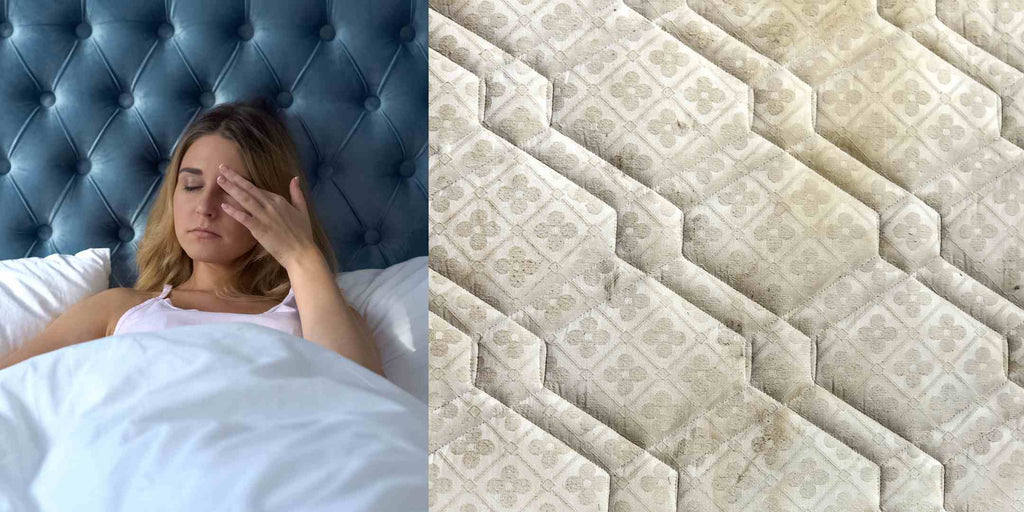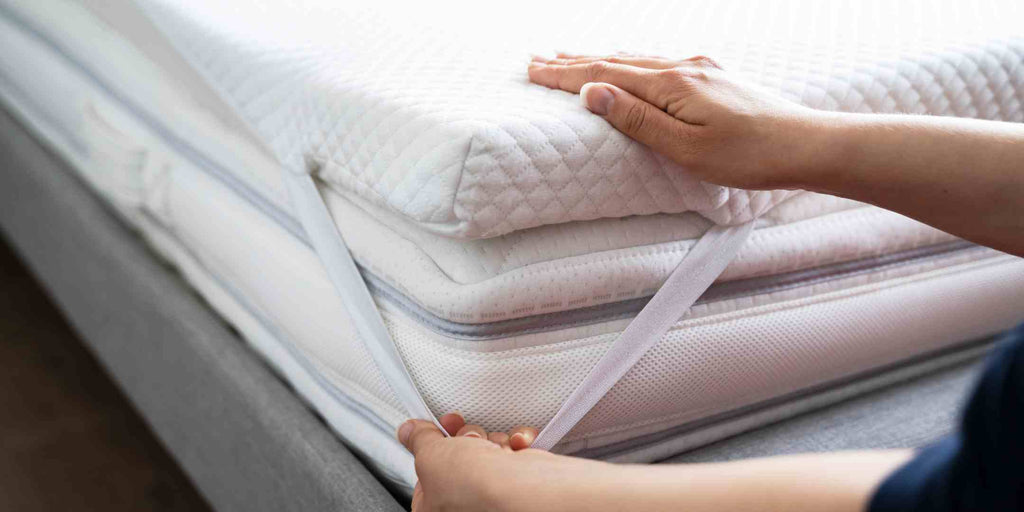A good night’s sleep is important for our well-being, and our choice of mattress can significantly impact the quality of our slumber. Many people opt for memory foam mattresses due to their reputation for offering excellent support and comfort. However, what happens when that once-perfect memory foam mattress begins to feel too firm? The answer lies in understanding the common causes behind this issue and exploring practical solutions to ensure you get the restful sleep you deserve.
Signs Your Memory Foam Mattress is Too Firm

Physical Discomfort
When your memory foam mattress is too firm, you might experience physical discomfort as it doesn't adequately contour to your body's shape. This discomfort can manifest as a sensation of pressure or stiffness in various body parts, particularly in areas like the shoulders, hips, and knees. Such discomfort can make it challenging to find a comfortable sleeping position and may result in a restless feeling during the night, ultimately disrupting your sleep quality.
Sleep Disturbances
An overly firm memory foam mattress can lead to sleep disturbances, such as frequent awakenings throughout the night or difficulty falling asleep in the first place. When your body cannot sink into the mattress sufficiently, it may create tension and discomfort, causing you to wake up multiple times during the night. These interruptions can prevent you from achieving a deep and uninterrupted sleep cycle, leaving you tired and groggy the next day.
Waking Up with Aches and Pains
Waking up with aches and pains indicates that your memory foam mattress is too firm. A mattress that doesn't provide adequate support can cause your body to remain in unnatural positions during sleep, leading to muscle stiffness and discomfort upon waking. Common areas for these aches and pains include the lower back, neck, and joints, which can negatively impact your overall well-being and daytime productivity.
Common Causes of Firmness in Memory Foam Mattresses

Normal Aging and Wear
Over time, memory foam mattresses may undergo natural wear and tear, causing them to lose some of their original softness and support. This ageing process can result in a firmer feel as the foam compresses and breaks down, especially in areas of the mattress that receive the most pressure.
Incorrect Mattress Choice
Selecting a memory foam mattress with the wrong firmness level can lead to discomfort. If you choose a mattress that is too firm for your sleeping preferences and body type, it won't correctly cradle your body, causing you to feel like you're sleeping on a hard surface. Conversely, choosing a too-soft mattress may also lead to inadequate support and discomfort.
Temperature-Related Issues
Memory foam is sensitive to temperature. Memory foam tends to become firmer in more excellent conditions, which can be problematic for those who prefer a softer feel. This temperature-related firmness can make the mattress feel less comfortable, especially in colder environments or during the winter months.
Improper Support
Memory foam mattresses require proper support from the foundation or bed frame. If the foundation is designed to provide adequate support, it can prevent the mattress from feeling firmer than intended. Additionally, using the wrong type of bed base can lead to uneven weight distribution, further contributing to a feeling of firmness and discomfort.
Solutions to Make Your Memory Foam Mattress Softer

Mattress Toppers and Pads
Temperature plays a significant role in the firmness of memory foam. Memory foam tends to be firmer in colder conditions, while it becomes softer and more pliable in warmer environments. Adjusting the room temperature to be slightly warmer can make your memory foam mattress feel softer and more comfortable, especially during colder seasons. However, be mindful of your comfort and avoid excessive heat, which can lead to discomfort during sleep.
Weight Distribution Techniques
Proper weight distribution can help alleviate the feeling of firmness in your memory foam mattress. To do this, consider adjusting your sleeping position to ensure your body weight is evenly distributed across the mattress. This may involve changing your sleeping posture or using additional pillows to support different body parts. Doing so can minimise pressure points and create a softer and more supportive sleeping experience.
Mattress Rotation and Maintenance
Regularly rotating and maintaining your memory foam mattress can prevent uneven wear and firmness issues. Over time, mattresses may develop indentations or sag in specific areas. Rotating the mattress periodically can distribute the wear more evenly. Additionally, following the manufacturer's maintenance recommendations, such as cleaning and flipping (if applicable), can extend the lifespan and comfort of your memory foam mattress, ensuring it remains soft and supportive.
When It’s Time Your Memory Foam Mattress Needs a Replacement

Sagging or Indentations
One of the most common signs that your memory foam mattress needs replacement is sagging or the formation of deep indentations where you sleep. As the foam deteriorates, it can no longer provide the necessary support, leading to uneven surfaces that can cause discomfort and back pain.
Reduced Support
Memory foam mattresses are designed to contour to your body and provide support. When you start feeling like the mattress is no longer supporting your body correctly, and you wake up with aches and pains, it may be time for a replacement.
Visible Wear and Tear
Inspect your mattress for visible signs of wear and tear, such as cracks, tears, or flaking. These are indicators that the materials have degraded significantly and are no longer functioning as intended.
Allergies and Odours
Over time, memory foam mattresses can accumulate allergens such as dust mites and mould, leading to allergy symptoms and unpleasant odours. If your mattress has an unpleasant smell that persists despite cleaning, it might be time to replace it.
Sleep Discomfort
If you find that you're not sleeping as well as you used to on your memory foam mattress, it may be due to its deteriorating condition. Uncomfortable sleep, frequent tossing and turning, or waking up feeling unrested are all signs that your mattress no longer provides adequate support and comfort.
Age
Memory foam mattresses typically have a lifespan of around 7-10 years, although this can vary depending on the quality of the mattress and how well it's maintained. If your mattress is nearing or has passed its expected lifespan, it's a good idea to start considering a replacement.
Changes in Weight or Sleeping Habits
Significant changes in your body weight or sleeping habits can impact the lifespan of your mattress. Weight fluctuations can lead to increased wear and tear, and changes in sleeping positions may affect how the mattress conforms to your body.
Noise
If your memory foam mattress begins to make creaking or squeaking noises when you move, it's a sign that the internal support structure may be compromised.
Conclusion

Achieving the perfect balance between firmness and comfort in your memory foam mattress is essential for a restful night's sleep. When you encounter signs of discomfort, sleep disturbances, or waking up with aches and pains, exploring solutions such as mattress toppers, adjusting room temperature, and weight distribution techniques is crucial. Maintaining your mattress through regular rotation and proper support can also prolong its lifespan.
However, there comes a time when even the best efforts cannot restore a mattress to its former comfort, signalling the need for a replacement. By addressing these essential elements, you can look forward to nights filled with uninterrupted, restorative sleep, ensuring that your mattress is not just a place to rest your body but a sanctuary for your well-being.








